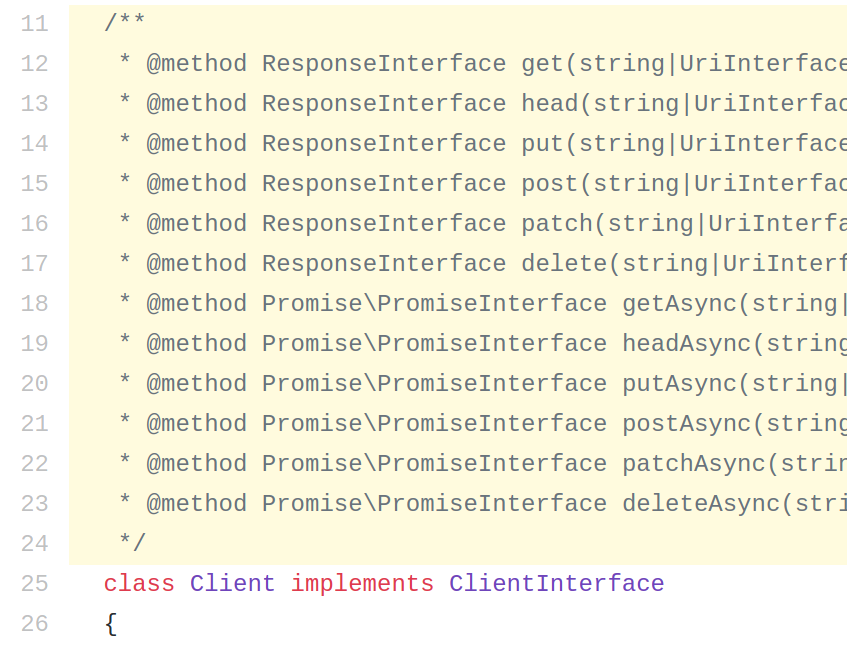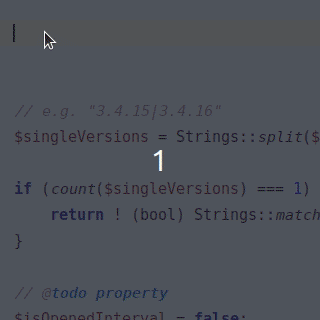14 Tips to Write PHP Code that is Hard to Maintain and Upgrade
Today I'll show you how to own your company. All you need to do is write code that no-one can read, is hard to refactor and creates technical debt. It's not easy, because if other programmers spot you're writing legacy code, you're busted.
If you keep a low profile of very smart architect and do it right, you'll be the only one in the company who knows what is going on and you'll have a value of gold. Learn how to be successful living vendor lock!
3 Signs of Living Vendor Lock-In
/vendor is a directory in your project with all the packages dependencies. Vendor lock-in is life-death dependency company on you.
It's like having a baby - you have to take care of it for the next 18 years (at least):

How to make company code depend on you? You want to write a code that static analysis and instant upgrades are very hard to use. Where Rector could help you to turn not-so-bad-code to the modern code base in a matter of few weeks, here will fail hard and the only way out will be greenfield review.

But not an obvious way like the right one. The company can't find out! You have to be sneaky as Eliot to E-Corp.
Here are 15 examples of such code collected from existing vendor lock-in projects I reviewed:
1. Never use final
Programmers want freedom, users desire options. Why setting healthy boundaries, when you can set them free:
<?php declare(strict_types=1);
namespace YourProject;
class PriceCalculator
{
}
That way, anyone can extend your class:
<?php declare(strict_types=1);
class BetterPriceCalculator extends PriceCalculator
{
}
Also, it's needed for mocking and there is no way around that. There's not even 8 reasons to use final anywhere anytime.
2. Use protected instead of private
What is opened class good for with private methods? You need to use protected method to be really opened:
<?php declare(strict_types=1);
class PriceCalculator
{
protected function calculatePrice(Product $product)
{
// ...
}
}
Be careful, public would be too obvious to anyone who ever heard that SOLID and other might find out what's your real intention.
<?php declare(strict_types=1);
class BetterPriceCalculator extends PriceCalculator
{
protected function calculatePrice(Product $product)
{
return 1000;
}
}
3. Use Non-String Method Names
This is tricky for real professionals - I hope you're to look smart in front of your team! If there is a way
<?php declare(strict_types=1);
class PriceCalculator
{
public function calculateDiscount(Product $product, string $type)
{
$methodName = 'calculate' . $type; // great job!
return $this->$methodName($product);
}
}
$methodName is a string - it can be anything, so freedom & dynamic!
<?php declare(strict_types=1);
class ProductController
{
public function orderProductAction(Request $request)
{
$form = new OrderProductForm;
$form->afterSubmit = [$this, 'processForm']; // great job!
$form->handle($request);
}
public function processForm(Request $request)
{
// ...
}
}
class Form
{
public $afterSubmit;
public function handle(Request $request)
{
// ...
call_user_func($this->afterSubmit, $request);
}
}
Why is this so well written? Imagine we're looking at the legacy code - huge code base, 100 of places where the method is used at.
Try to rename processForm to processOrderProduct - AST is not able to detect method name, all it sees is a string. Instant upgrade impossible and you have to do it all manually, good job!
4. Don't Always use PSR-4
Classes need to be autoloaded to be parsed to AST. PSR-4 section in composer.json solves this easily:
{
"autoload": {
"psr-4": {
"App\\": "src"
}
}
}
Damn, now every class is easy to find and respects file.php → Class naming. How could you complicate this?
Put more Classes into 1 file
<?php declare(strict_types=1);
class FatalException extends Exception
{
}
class ApplicationException extends Exception
{
}
class RequestException extends Exception
{
}
You have 1 file instead of 3 - you saved so much disk space!
Use Small Case Naming
/app
/Controller
ProductController.php
↓
/app
/controller
ProductController.php
PSR-4 is unable to find this file, great job!
Don't Load Tests
Let's say your /app code is loaded by PSR-4. You also have covered it with tests. If you run instant upgrades, it should actually upgrade tests too. Damn.
If you have this section, drop it:
-{
- "autoload-dev": {
- "psr-4": {
- "App\\Tests\\": "tests"
- }
- }
-}
PHPUnit uses its own autoload anyway.
5. Use Your Own Autoloader
While you're at it, follow PHPUnit example. And not only PHPUnit. Have you ever wondered why there is missing "autoload" section PHP_CodeSniffer composer.json
Make your own autoloader - using spl_autoload_register or nette/robot-loader. That way instant upgrade tools get confused and probably won't work. Good job!
6. Hide Your Dependencies in Constructor
<?php declare(strict_types=1);
class PackagistApi
{
public function getPackagesByOrganization(string $organization): array
{
$guzzle = new Guzzle\Client();
$response = $guzzle->get('https://packagist.org/packages/list.json?vendor=' . $organization);
// ...
return $packages;
}
}
$packagistApi = new PackagistApi;
$shopsysPackages = $packagistApi->getPackagesByOrganization('shopsys');
When you send such code a to code-review, you are provoking this comment:
- "
PackagistApihidesGuzzle\Clientdependency. Put that into constructor injection"
Busted! But there is a way to improve your chances to make this pass and still skip constructor injection:
<?php declare(strict_types=1);
class PackagistApi
{
private $guzzle;
public function __construct()
{
$this->guzzle = new Guzzle\Client();
}
public function getPackagesByOrganization(string $organization): array
{
$response = $this->guzzle->get('https://packagist.org/packages/list.json?vendor=' . $organization);
// ...
return $packages;
}
}
7. Put Different Kinds of Objects to One Directory
Do you love DDD? Everyone loves it! Thanks to DDD you have socially accepted reason to use directory names based on categories:
/app
/Controller
ProductController.php
/Entity
Product.php
/Repository
ProductRepository.php
↓
/app
/Product
ProductController.php
Product.php
ProductRepository.php
Who needs standards! It's this nice? Now no-one can find any classes by expected directory name.
As a bonus, service auto-discovery is not possible anymore:
services:
App\:
resource: '../app'
exclude: '../app/{Entity}'
Great job!
8. Use Annotations to Define Magic Methods
Now you know how to use strings in method names from tip #3. Let's get this to the next level. I've already used this tip above:
<?php declare(strict_types=1);
$guzzle = new Guzzle\Client();
$guzzle->get('...');
What happens when you type get method? The IDE will tell you the get method exists. You can adapt this pattern to your code too!
Then you rename it with instant upgrade tools, but it will fail. It's not a string... so what the hack?
It's only an annotation:

You now have a reason to add __call integration and combine method names with many more strings. Great job!
9. Use Traits with Annotations to Define Magic Methods
You can take this to one more level!
<?php declare(strict_types=1);
class ApiCaller
{
use GetMethodTrait;
}
/**
* @method getPackagesByOrganization($organization)
* @method getPackagesByCategory($category)
*/
trait GetMethodTrait
{
}
Goodbye automated typehints and static analysis!
10. Don't use a Different Naming to separate Interface, Trait from Class
Oh, I actually made a mistake. Above I wrote GetMethodTrait, that might actually help the user and tool to guess it's a trait:
- ProductInterface
- ProductTrait
- Product
We don't want that. Let's take another cool tip from DDD and make them look the same ↓
- Product
- Product
- Product
Now no-one can use Finder to find all traits or interface. Each file has to be parsed now and that's super slow. Good job!
11. Use as Short Naming as Possible
Long class names are annoying to read. Just compare yourself:
- YamlParser
- YamlFileParser
- LatteTemplateParser
- LatteParser
- XmlParser
This is much better ↓

It also it also increases chances to bother with manual aliasing:
<?php declare(strict_types=1);
use Yaml\Parser;
use Latte\Parser as LatteParser;
use Xml\Parser as XmlParser;
class ProductXmlFeedCrawler
{
}
WTF, it's so good!
12. Don't use a Different Naming to separate Abstract classes
Abstract classes are also classes. Why would make that easier for a reader by stating that in a name? Have you ever seen an AbstractInterface or AbstractTrait? I did not.
-abstract class AbstractXmlCrawler
+abstract class XmlCrawler
Let them look into to class manually. Time well spent!
13. Use Fluent API with Different Return Values
Fluent interfaces are great, they save you typing the variable name all over again:
<?php declare(strict_types=1);
class Definition
{
private $class;
private $arguments;
public function setClass(array $class)
{
$this->class = $class;
return $this;
}
public function setArguments(array $arguments)
{
$this->arguments = $arguments;
return $this;
}
}
$definition = (new Definition)->setClass('ProductController')
->setArguments(['@Request']);
The best thing is, there are more ways to create the same object:
<?php declare(strict_types=1);
$definition = new Definition;
$definition->setClass('ProductController');
$definition->setArguments(['@Request']);
How can anyone use that incorrectly now?
14. Use Fluent API with Different Return Values
Let's take fluent to the next level - make every method return different object:
<?php
// ...
$rootNode
->beforeNormalization()
->ifTrue(function ($v) { return !isset($v['assets']) && isset($v['templating']) && class_exists(Package::class); })
->then(function ($v) {
$v['assets'] = array();
return $v;
})
->end()
->children()
->scalarNode('secret')->end()
->scalarNode('http_method_override')
->info("Set true to enable support for the '_method' request parameter to determine the intended HTTP method on POST requests. Note: When using the HttpCache, you need to call the method in your front controller instead")
->defaultTrue()
->end()
->scalarNode('ide')->defaultNull()->end()
->booleanNode('test')->end()
->scalarNode('default_locale')->defaultValue('en')->end()
->arrayNode('trusted_hosts')
->beforeNormalization()->ifString()->then(function ($v) { return array($v); })->end()
->prototype('scalar')->end()
->end()
->end()
;
Fluent API like this is proven to break PHPStan and thus Rector. Such code is almost impossible to upgrade instantly. The longer the fluent methods, the bigger the damage - great job!
Do you know more tips to write code that is hard to maintain and upgrade in not-so-obvious way? Let me know in the comment, I'll update the list with them.
P.S.: If you love sarcastic posts like this, go check Eliminating Visual Debt by Marco Pivetta or How to Criticize like a Senior Programmer.